Col. Sudhir Farm
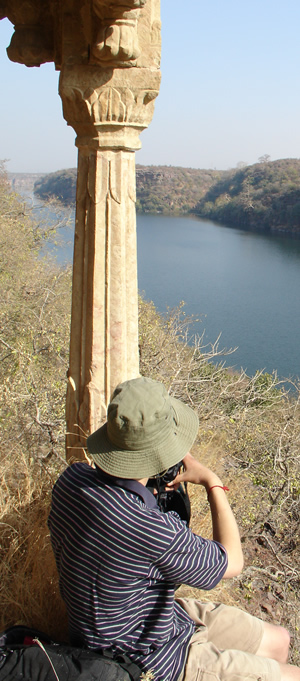
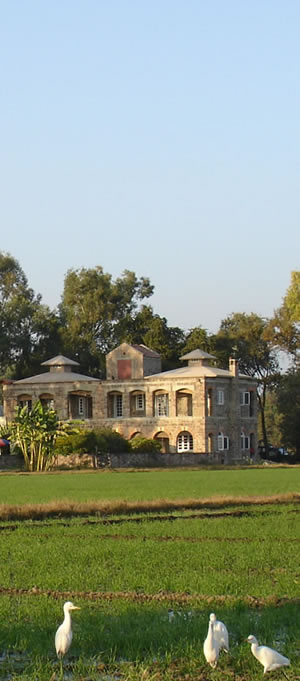
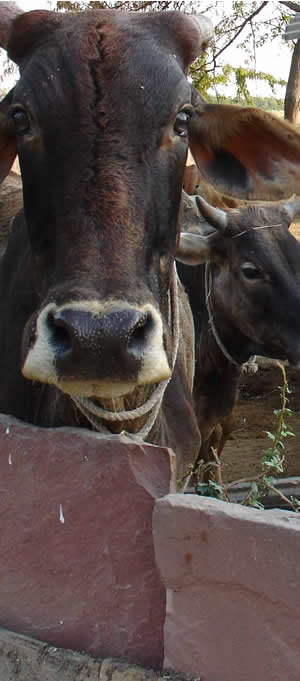
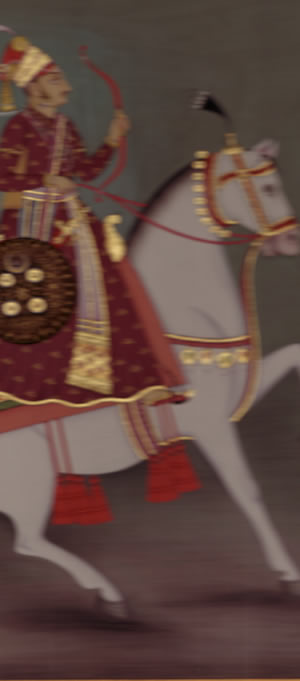
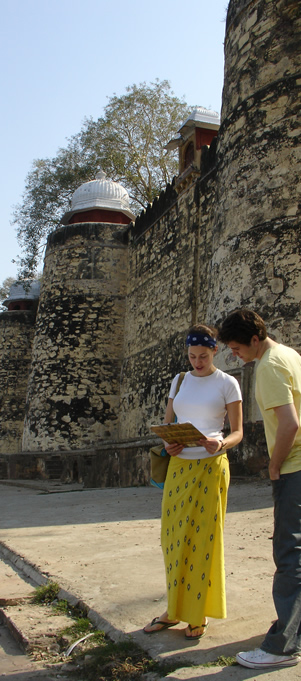
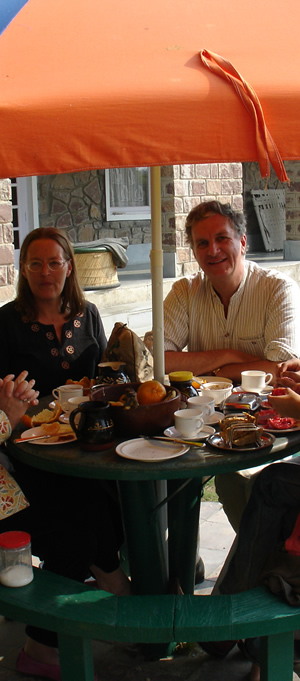
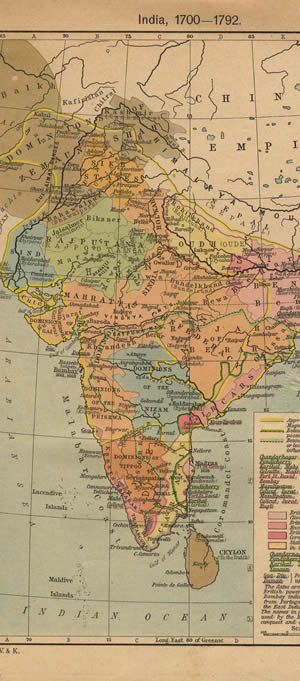
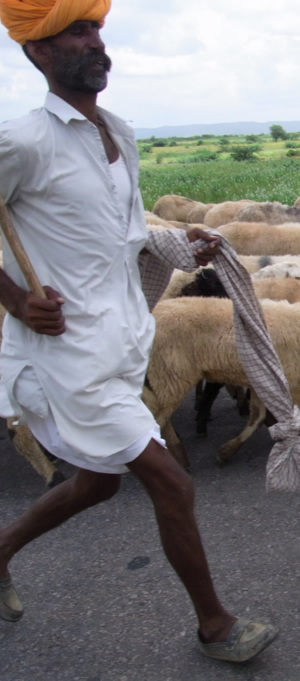
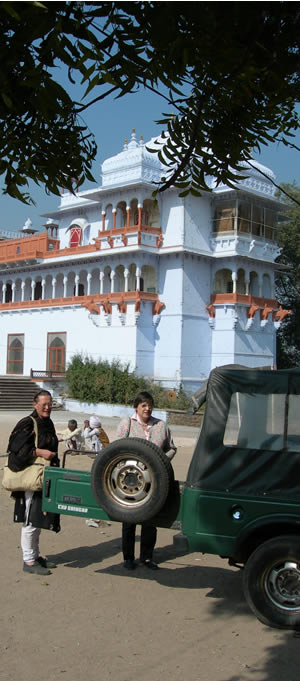
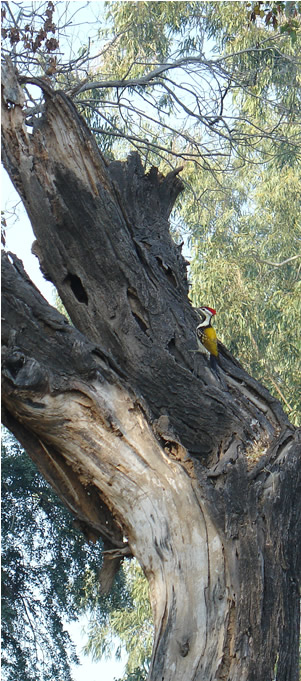
Snippets from the Visitors' Book
The Kota tonga trail was a real highlight - a bit like a 19th Century treasure hunt. It’s full of little nuggets of unusual information and fascinating glimpses into the unsolved mysteries of Kota.
Harriet and Will, London. UK
The memorial to Major Burton and his sons was much more moving than the Taj Mahal or the lake at Udaipur, marvellous as they are.
Henry Vane, Cumbria, UK
...the most comfortable bed I’ve slept in for 2 months....
Charlotte Adam, Winchester UK
Two days out of the noise and the people in a beautiful place. We felt totally
at home
- To be recommended to every person who wishes to experience the Indian country life. We also liked the way the food was prepared...
Patrick & Marie-Christine Lemaigre, Nil-St Vincent, Belgium
We’re only here for the porridge and home made bread! Thank you for a most wonderful time the memories of which we shall carry always. You have given us a wonderful & fascinating introduction to India.
Sue Turner, Lancashire, UK
So ...Rajasthan is not all desert! Thank you for sharing everything with us....
The Read family, London, UK
What a wonderful time we’ve had at the school in the village, at the weavers’, on the river, atop a tonga! Thank you for all your help and contacts throughout India
Anne Gerbner, Philadelphia, USA
It was a wonderful stay and thank you for giving us such a positive look at India and Rajasthan.
Salma Goldstein, New Jersey, USA
- There once was a lady of Kota
- Who took visitors out in her motor
- With the roads and the ruts
- It took quite some guts
- To go out with the lady of Kota.
- But once back at home on the farm
- The world quite descended to calm
- With the plants and the birds
- And fox terriers in herds
- There was balm in the calm on the farm.
Sue Millar, London, UK
After travelling around Rajasthan for two weeks, reaching a real house with books on the shelves, photos on the walls and four happy dogs was simply wonderful.
Camille Savinien, Paris, France
This isn’t tourism. I know of nowhere else where you can experience the real India as well as on your traditional working Rajasthani farm.
Sam Milward, Wellington, New Zealand
Thank you so very much for such a wonderful stay - what a fantastic introduction to India. I don’t think we’ll find such tranquillity elsewhere.
Lizzie Fortune, Hampshire. UK
Fabulous - I’ve been spoilt. It’s hard to leave and face the real world.
Elisabeth Simson, Isle of Wight, UK
After travelling around Rajasthan for two weeks, reaching a real house with books on the shelves, photos on the walls and four happy dogs was simply wonderful.
Camille Savinien, Paris, France
This isn’t tourism. I know of nowhere else where you can experience the real India as well as on your traditional working Rajasthani farm.
Sam Milward, Wellington, New Zealand
Thank you so very much for such a wonderful stay - what a fantastic introduction to India. I don’t think we’ll find such tranquillity elsewhere.
Lizzie Fortune, Hampshire. UK
Our visit at the farm was truly wonderful, off the beaten track it is a slice of India a visitor does not normally experience. Victoria is very knowledgeable about Indian culture and the people - an added perspective for us. The food here was very delicious: organically home grown ingredients, vegetables, fruits, grains prepared simply homestyle. A nice change from curries. Enjoyed the early morning boat ride and walk to the weavers. Many thanks.
Johanna Janssens, Washington, USA
I loved staying with you and the dogs and playing with the toys.
Jonas aged 8, Switzerland
A very welcome break from the crazy world of India – wonderful house, food and hospitality. Thank you so much.
Katie Buxton, Bath, UK
I loved seeing the crocodiles, and I learned a lot about deticking the puppies. Coming to the farm was a great experience.
Stella Bartholet, Washington, USA
A wonderful eye opening visit in every sense. We will be back! Thank you!
Christopher & Joanna Hobson, Northamptonshire, UK
A blissfully peaceful stay. We enjoyed everything – even the power cut. Thank you for lovely food, good company and very interesting trips.
Vicky Stark, London, UK
Exactly what we hoped for and more, bits of India off the tourist track, life as it actually is in villages, teeming life and livestock and the magic of the river.
Sir Hilary Miller, Worcester, UK
Thank you for the introduction to miniature painters, wall paintings, stories, great food, good company, walk through the fields. I loved the paintings in the City Palace and go back full of inspiration and memories.
Nan Mulder, Edinburgh, UK

On the Farm - 2021 Archive
On the Farm - December ’21
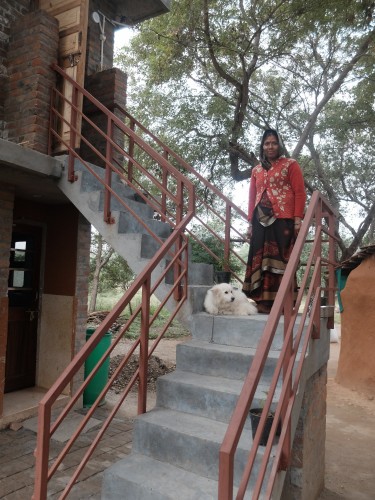 Narayan, his wife Shyam, their eldest son Deepak aged 19, and their younger son Nitesh aged 14, had moved into their new home here at the end of November with Fruti their Pomeranian bitch. We have a rule that no other dogs can live on the farm but Fruti helps fill the gap left by the suicide of their middle son who hanged himself with his mother’s sari this time last year.
Narayan, his wife Shyam, their eldest son Deepak aged 19, and their younger son Nitesh aged 14, had moved into their new home here at the end of November with Fruti their Pomeranian bitch. We have a rule that no other dogs can live on the farm but Fruti helps fill the gap left by the suicide of their middle son who hanged himself with his mother’s sari this time last year.
Lucy, our bitch, is very jealous of the pretty Fruti and attacked her on 9th December in full view of everyone. Tigger and Doosra dashed to join in and within a few seconds she was on her back, totally traumatised with three sets of teeth marks. Since then she is locked up for a short period in their house when we go round with the dogs for our evening walk.

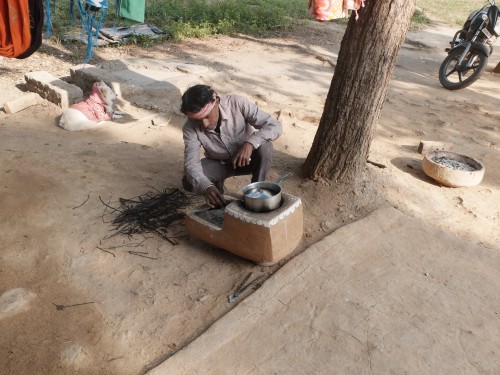 Another animal drama has to do with cows. Narayan reported some maggot wounds in feet and bleeding and we called the local vet compounder. He announced that the herd had foot-and-mouth but there was no talk of slaughtering them. He gave each 3 injections costing GBP 2.50 (Rs. 250) per animal. He said we could also try the local cure involving fish. I was keen to see this and gave Rs. 50 to Narayan to get some fish.
Another animal drama has to do with cows. Narayan reported some maggot wounds in feet and bleeding and we called the local vet compounder. He announced that the herd had foot-and-mouth but there was no talk of slaughtering them. He gave each 3 injections costing GBP 2.50 (Rs. 250) per animal. He said we could also try the local cure involving fish. I was keen to see this and gave Rs. 50 to Narayan to get some fish.
On 8th December a Bhil arrived on a bicycle with a cotton bag of small fish caught in the canal. He tipped them on the ground and Narayan chose four. These were boiled up in water on his outdoor chula until they had disintergated. The water was diluted and cooled and thrown at the cow’s hooves with a plastic mug. The idea seemed to be that the smell would kill the maggots or drive them away. Since the injections had already dealt with the maggots it was declared a success. But what effect did the fish water have on the foot-and-mouth?

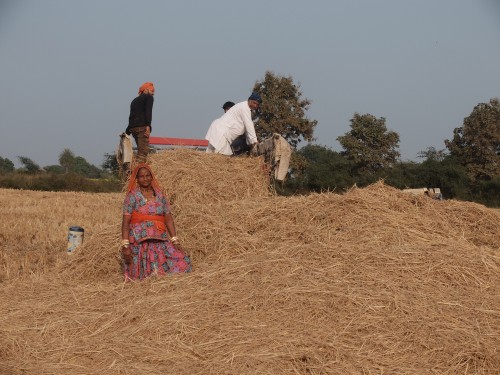 After heavy rain in November the land was quite moist. The main activities of the month were to hand cut and thresh the last 20 bighas of rice and sell the straw that had been left scattered around the field by the last month’s combine harvester before further rain arrived.
After heavy rain in November the land was quite moist. The main activities of the month were to hand cut and thresh the last 20 bighas of rice and sell the straw that had been left scattered around the field by the last month’s combine harvester before further rain arrived.
This family were originally from Pali district, and have settled near Kota. Using unpaid family labour they raked up the straw and took it away on a trolley doing two trolley loads a day for several days. They paid a nominal amount per bigha of Rs. 500, but it meant straw was removed and not burnt.

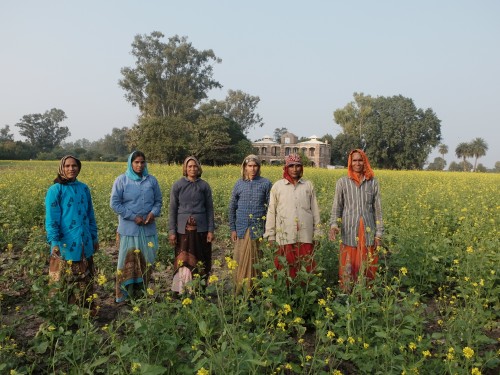 This is our team of labourers this winter rather depleted in number. They have cut 20 bighas of rice and loaded the straw into trolleys for our cows. They wanted to be photographed in the mustard with the house in the background.
This is our team of labourers this winter rather depleted in number. They have cut 20 bighas of rice and loaded the straw into trolleys for our cows. They wanted to be photographed in the mustard with the house in the background.

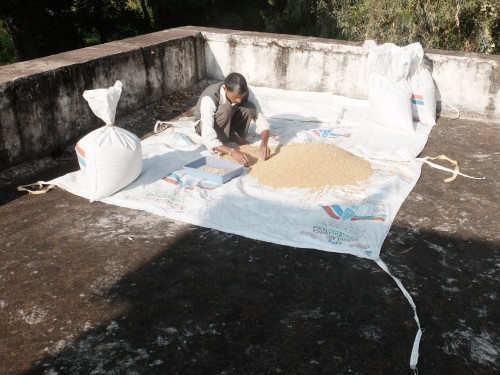 After the rice fields were cleared of straw, the few remaining wisps were burnt and then the fields were ploughed and wheat planted. Before sowing our stored C306 deshi organic wheat had to be cleaned to remove any insects but this year there were none.
After the rice fields were cleared of straw, the few remaining wisps were burnt and then the fields were ploughed and wheat planted. Before sowing our stored C306 deshi organic wheat had to be cleaned to remove any insects but this year there were none.

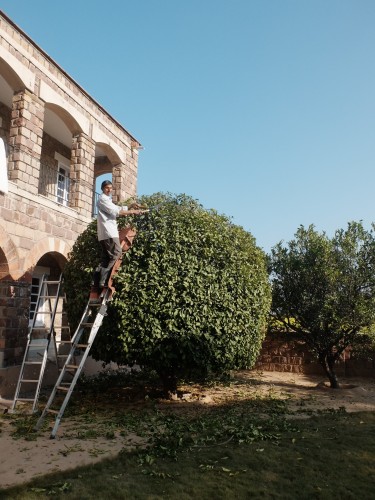 Our Christmas preparations include trimming this orange tree into a neat round that we can decorate with tinsel and baubles. This year, for the first time in 16 years our daughter Anjali was with us to help decorate the tree.
Our Christmas preparations include trimming this orange tree into a neat round that we can decorate with tinsel and baubles. This year, for the first time in 16 years our daughter Anjali was with us to help decorate the tree.

December ended with another 2 cms. of rain and more is forecast for January. Having stored the rice we winnowed it and loaded it into trolleys to be sold on 24th December. The rest was well covered in thick black plastic to keep it dry.

On the Farm - November ’21
Divali was on 4th November this year and as crackers were once again allowed, the air in Delhi and North India was foul. Delhi was so bad that schools and government offices were closed for days.
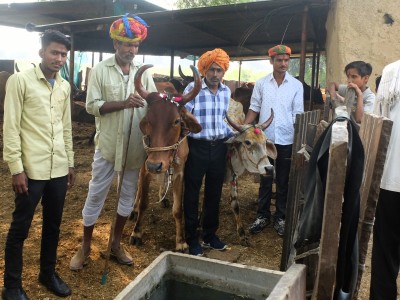
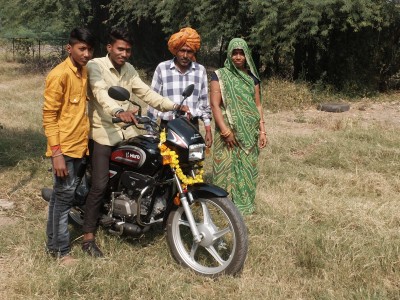
The second day of Divali is Govardhan puja, when the cows are decorated, honoured and venerated. The boy on the left - Deepak - has been looking after the cows while his father, Narayan (third in line from the left)was finishing his contract elsewhere. Now Deepak has gone back to his pre-lockdown job of selling mattresses in town and the family has bought a second brand new motorcycle. Here at Govardhan puja, they have decorated the new bike to invoke divine blessings.
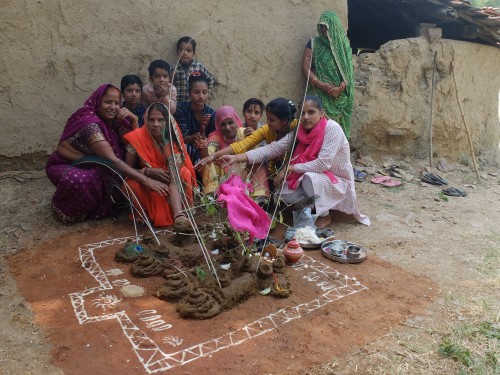 And here is the women’s team that did the puja.
And here is the women’s team that did the puja.

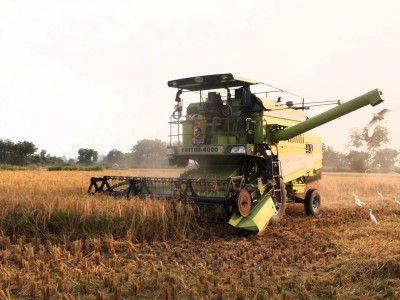
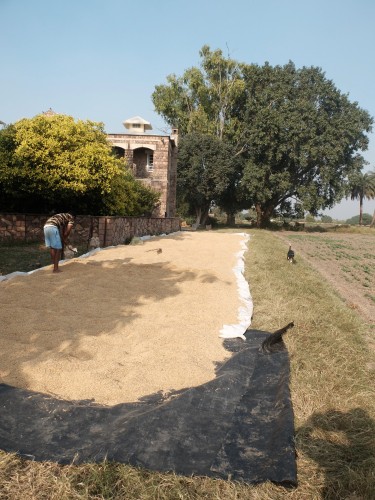
The combine harvester came on the 7th and cut half the rice crop which was then spread out to dry. We knew rain was on the way so it was loaded into trolleys or gathered in a big pile and covered with black plastic when 3.51 cms. of rain fell over three days from 18th November.
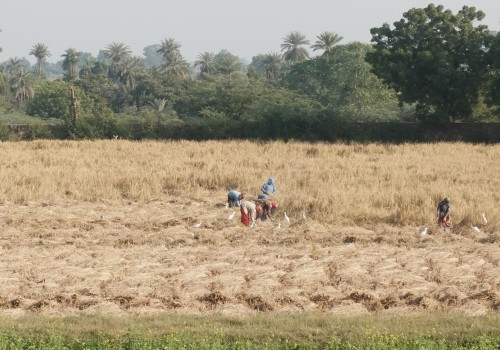 The rest of the unharvested rice was standing in the fields and after it had dried after the rains, it was cut by hand partly because a lot of it had been blown over by the high winds and partly because we wanted the pral or rice straw as feed for the cows. We had to pay the women Rs. 1800 per bigha to cut the fallen rice, well above the going rate of Rs. 1500. (Spot the young deer/nilgai where the line of rice meets the green hedge!)
The rest of the unharvested rice was standing in the fields and after it had dried after the rains, it was cut by hand partly because a lot of it had been blown over by the high winds and partly because we wanted the pral or rice straw as feed for the cows. We had to pay the women Rs. 1800 per bigha to cut the fallen rice, well above the going rate of Rs. 1500. (Spot the young deer/nilgai where the line of rice meets the green hedge!)
In contrast to hand-cutting the rice, the combine harvester leaves the rice straw scattered across the fields and the easiest thing to do is to burn it, but this illegal as well as being undesirable. We sold it cheaply to someone willing to bring a team to rake it up for approximately Rs. 200/bigha as opposed to last year’s rate of Rs. 500. In some fields a little was burnt which had not been raked up. While this was happening COP26 was going on, trying to persuade India to sign up to stopping subsidies on cooking gas for the poor. Getting LPG connections to millions of villagers has been one of PM Modi’s greatest achievements. Cooking on wood, in confined spaces particularly, has been one of the leading causes of death from respiratory diseases as well as a major cause of deforestation. By removing subsidies on gas people would go back to cooking on wood. India has it’s own priorities and refused to be bullied.
The mustard, which had germinated poorly was badly affected by the heavy rain coming soon after watering leading to water logging as a result many plants died. On top of that deer/nilgai were biting off the shoots here and there. By the end of November, the mustard was beginning to flower. The bersin for the cows had been sown and the next jobs are to sell the rice and plant wheat.

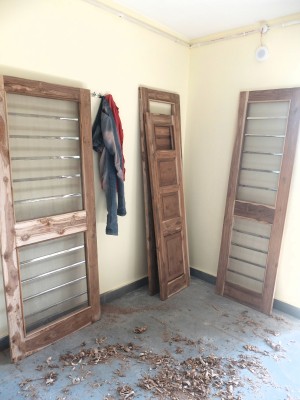 Work on the room above the workers’ toilets went on slowly and the interior was painted a pale yellow. By 26th November the doors were ready to be fitted. The joiner lives in the nearby village. On the 28th Narayan and family moved into their new one room home with all their belongings.
Work on the room above the workers’ toilets went on slowly and the interior was painted a pale yellow. By 26th November the doors were ready to be fitted. The joiner lives in the nearby village. On the 28th Narayan and family moved into their new one room home with all their belongings.

Covid cases were non-existent but fear of a ‘third wave’ has kept private schools closed for younger children. The vaccine rollout has gone on steadily but with our rice cutting women all complaining of having been ill for three months since their first dose with fever and aching joints there is not much enthusiasm for a second dose. At the time of writing India has declared the pandemic over. Covid is now endemic. This has been achieved by early treatment of covid using a combination of ivermectine or hydraoxychloroquine, along with zinc, magnesium, Vit D and Vit C among others and vaccination has played a minor role. A success story not mentioned in the west.

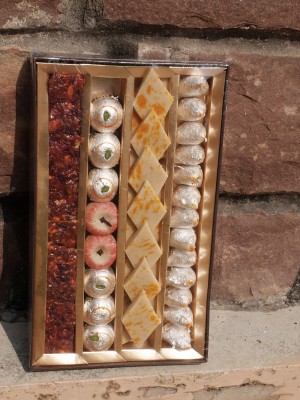 And to end on a happy note, our fourth grand child was born on 15th November, her elder sister’s 8th birthday, and these were the mithais we distributed to celebrate the occasion.
And to end on a happy note, our fourth grand child was born on 15th November, her elder sister’s 8th birthday, and these were the mithais we distributed to celebrate the occasion.

On the Farm - October ’21
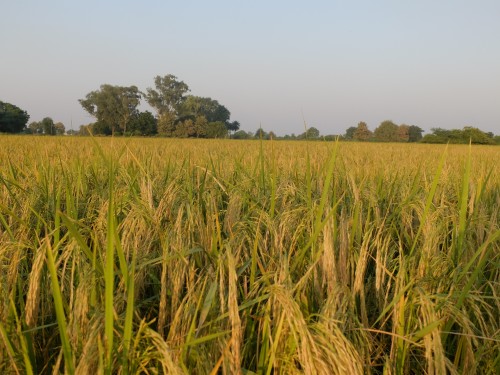 October is a transitional month between the high humidity and rain of September and a dry cool winter. It only rained once but 1.89 cms. fell and germination of the mustard was affected.
October is a transitional month between the high humidity and rain of September and a dry cool winter. It only rained once but 1.89 cms. fell and germination of the mustard was affected.
The beginning of the month had been busy with ploughing the fields ready for planting mustard. It was decided to go for the cheaper Pioneer 42 variety costing Rs.600/kg. against the latest version Pioneer 46 which cost Rs.800/kg. Pioneer seed is imported from America and is patented there. The supply can be turned off at any time. Sowing was done on the 12th; seed, DAP and sulphur were mixed together. A shortage of fertiliser is forecast. Petrol, diesel and gas prices have increased Rs.30/litre over the last few months.
The rice was kept watered but by the end of October was looking ripe. The land to be used for our local wheat was prepared and ploughed.

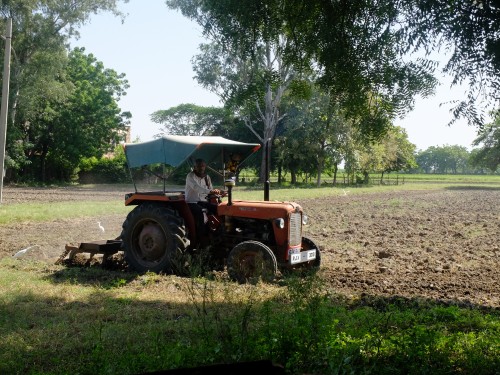 I went to England on 1st October for my brother’s funeral and had to quarantine for 10 days in one place and pre-pay for postal covid tests on days 2 and 8 of my arrival. A test in Jaipur before flying out, one in Reading before coming back and a final one at Delhi airport which cost Rs.500 for exactly the same thing as I’d paid 89 GBP in England.
I went to England on 1st October for my brother’s funeral and had to quarantine for 10 days in one place and pre-pay for postal covid tests on days 2 and 8 of my arrival. A test in Jaipur before flying out, one in Reading before coming back and a final one at Delhi airport which cost Rs.500 for exactly the same thing as I’d paid 89 GBP in England.
On almost the same day as my brother died after a three-year decline due to progressive supra nuclear palsy, Sugna’s brother’s young son-in-law threw himself in front of a train with no warning leaving a young widow and a five-year old son, who have come back to live with her parents. That is the second suicide in the last few months to family members of our four employees.
Rajasthan has not had a covid death for three months but schools still only open for older classes with attendance on alternate days. Younger children started at the local government school for a couple of hours a day and were taught as per their age having been given automatic promotion even though they had never had formal schooling. The school was making no effort to bridge the gap despite official policies and the children are only learning to sit still and copy. Millions of young children in India must be in this position. Their education has been sacrificed to keep the rest of the economy going and to slow the spread of the virus. In that sense it has been a successful policy, but at what cost?

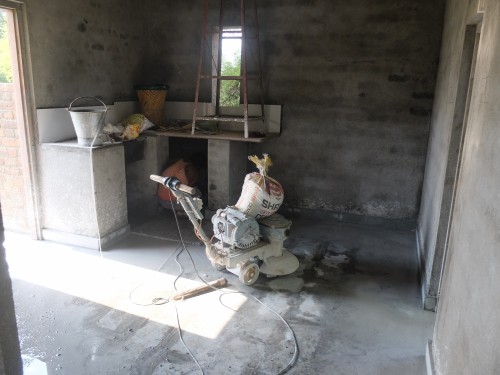
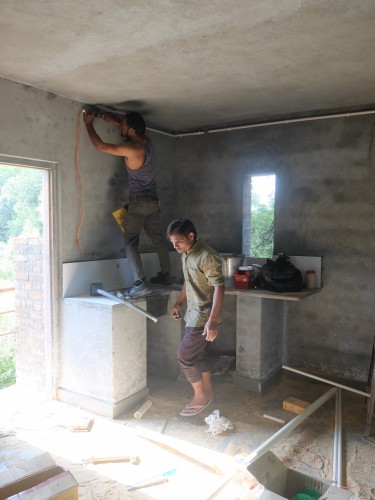
During October the building project progressed. Metal railing were made and attached to the steps. Men came to lay the floor tiles and by 25th they were ready to be polished. Notice the figure under the sink polishing tiles.
Once the floor had been polished, the plumber and electrician arrived on the same day to fix the wiring and plumb the sink.

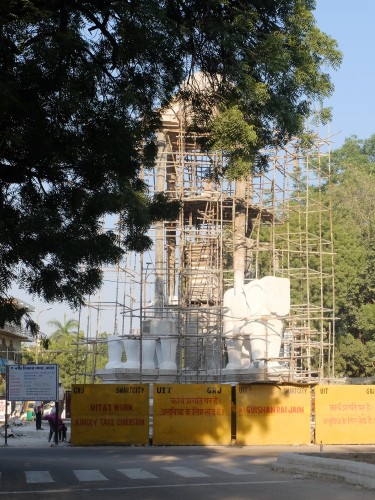 And to finish this month›s blog I would like to show the marble white elephants that are being assembled in Kota. This is a roundabout outside the law courts and apparently it will commemorate the 1857 rebels or 'freedom fighters' who were strung up to neem trees outside the British Residency while sitting on elephants. The elephants were then led away....
And to finish this month›s blog I would like to show the marble white elephants that are being assembled in Kota. This is a roundabout outside the law courts and apparently it will commemorate the 1857 rebels or 'freedom fighters' who were strung up to neem trees outside the British Residency while sitting on elephants. The elephants were then led away....

On the Farm - September ’21
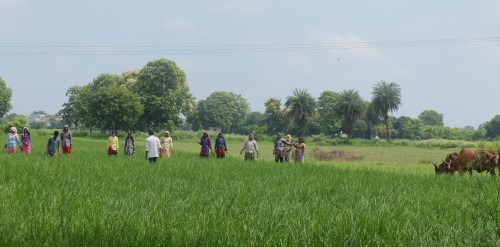 In September we had light rain distributed throughout the month and a total of 11.17 cms. as compared to 56 cms. in August. The humidity was high as we were surrounded by flooded rice fields. The main activity was watering the rice and weeding it.
In September we had light rain distributed throughout the month and a total of 11.17 cms. as compared to 56 cms. in August. The humidity was high as we were surrounded by flooded rice fields. The main activity was watering the rice and weeding it.
We employed this team of women to wade through the rice removing weeds. The cows can be seen enjoying grazing in the background on monsoon grass.

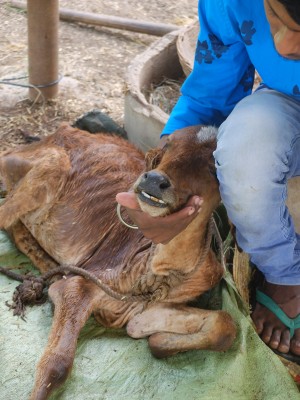 One more calf succumbed in September. With a white blaze on her forehead, she was proof that Diamond had fathered at least one calf before he died last month. Heera is Hindi for diamond and she had never been strong. She sat down in the sun one day and overheated and became bloated and couldn’t get up. Deepak sprayed her with water to cool her down and we called the vet who didn’t hold out much hope. Before I could buy the prescribed tonics after a night of regular sugar syrup doses which she had survived, she died.
One more calf succumbed in September. With a white blaze on her forehead, she was proof that Diamond had fathered at least one calf before he died last month. Heera is Hindi for diamond and she had never been strong. She sat down in the sun one day and overheated and became bloated and couldn’t get up. Deepak sprayed her with water to cool her down and we called the vet who didn’t hold out much hope. Before I could buy the prescribed tonics after a night of regular sugar syrup doses which she had survived, she died.

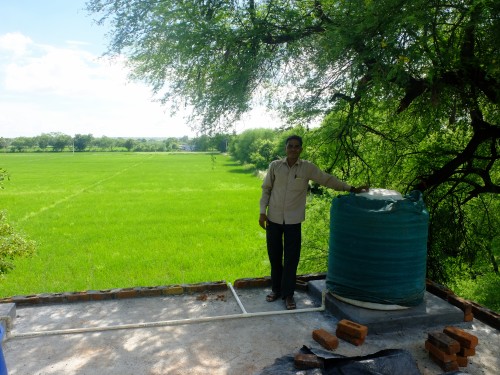 Work on the RAT (Room Above Toilets) went on slowly. Hemraj, a plumber, came on 3rd September and moved the water tanks up a floor onto the roof and did the necessary plumbing. You can see the young rice behind him.
Work on the RAT (Room Above Toilets) went on slowly. Hemraj, a plumber, came on 3rd September and moved the water tanks up a floor onto the roof and did the necessary plumbing. You can see the young rice behind him.
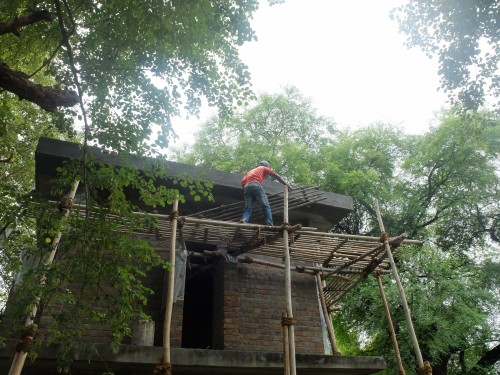 Plastering was done after the plumbing was complete and this rickety bamboo scaffolding was put up. It’s no wonder that masons tend to be small, wiry and nimble as they have to risk their lives on such scaffolding with no safety equipment and no compensation for injury.
Plastering was done after the plumbing was complete and this rickety bamboo scaffolding was put up. It’s no wonder that masons tend to be small, wiry and nimble as they have to risk their lives on such scaffolding with no safety equipment and no compensation for injury.

One interesting statistic for September was that 1.6 million students took a government teachers entrance examination in Rajasthan alone. The internet was turned off on Sunday, 26th September throughout the state to deter cheating. Students were allocated test centres around the state and in one tragic incident a van load of 12 hopefuls were all killed as they made their way in the early morning from Baran to Shekawati in northern Rajasthan when their van ran into a truck.
Hundreds of thousands of candidates piled into buses and trains to reach their examination centres but there was no subsequent surge in covid19 which had disappeared from Rajasthan. Seasonal diseases such as malaria and dengue are the current health worries. The schools, however, are not all back and junior classes are still being taught online, or not at all as the case may be.

On the Farm - August ’21
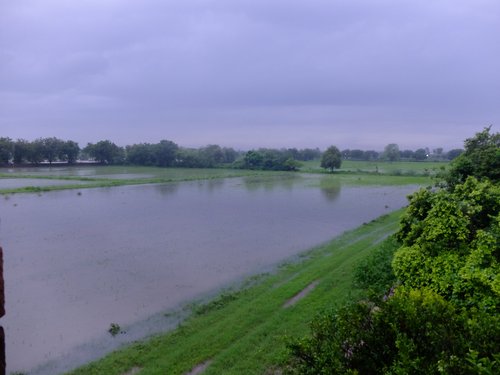 The August story is about rain. We had 56.25 cms, 47.74 cms of which fell in the first week. The whole farm appeared to be one big rice field. In this picture the field in the foreground is not a rice field, although the others are. You can see beyond the wall, beneath the trees on the left, that the stream came right upto the wall so the excess water could not drain away.
The August story is about rain. We had 56.25 cms, 47.74 cms of which fell in the first week. The whole farm appeared to be one big rice field. In this picture the field in the foreground is not a rice field, although the others are. You can see beyond the wall, beneath the trees on the left, that the stream came right upto the wall so the excess water could not drain away.
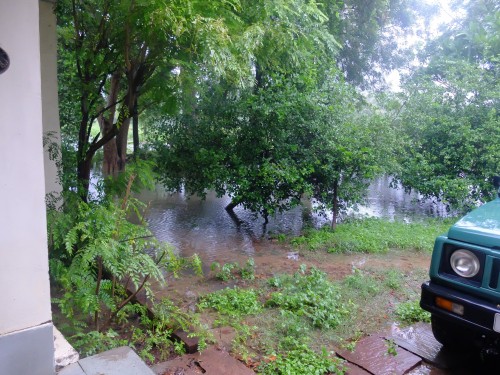 On 4th August there was 12.39 cms of rain in the night and the garden was under water. Rain leaked in multiple places in the old part of the house and the wiring was wet so the fridge and TV had to be moved out of the old part of the house. The men couln’t get out of their village until 2.00pm when the water had gone down considerably. Their local transformer was standing just above the water line and so the linesman turned off the power for two days and with it the internet.
On 4th August there was 12.39 cms of rain in the night and the garden was under water. Rain leaked in multiple places in the old part of the house and the wiring was wet so the fridge and TV had to be moved out of the old part of the house. The men couln’t get out of their village until 2.00pm when the water had gone down considerably. Their local transformer was standing just above the water line and so the linesman turned off the power for two days and with it the internet.

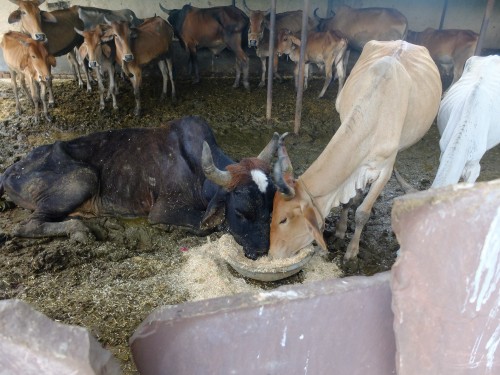 The main casualty of such continuous rain was our black bull Diamond. Completely unexpectedly he sat down on 1st August and refused to get up desite the efforts of 7 men using wooden poles to support him underneath and lift him. We gave him boiled wheat with gur am and pm to build up his strength. We put bhoussa (chaff) around and under him and moved him out of the mud. He was sitting up at 10.00pm on 5th August but passed away in the night. The general feeling was that he was Angrezi or foreign i.e. the product of AI, he had weak teeth and so hadn’t been eating properly. He was 13, having adopted us as a 2-year old in 2012.
The main casualty of such continuous rain was our black bull Diamond. Completely unexpectedly he sat down on 1st August and refused to get up desite the efforts of 7 men using wooden poles to support him underneath and lift him. We gave him boiled wheat with gur am and pm to build up his strength. We put bhoussa (chaff) around and under him and moved him out of the mud. He was sitting up at 10.00pm on 5th August but passed away in the night. The general feeling was that he was Angrezi or foreign i.e. the product of AI, he had weak teeth and so hadn’t been eating properly. He was 13, having adopted us as a 2-year old in 2012.
Diamond is seen here sharing some chickpea straw with his favourite companion. The problem then was how to get him to the road from where the authorities would collect him, for a fee. We had to remove some flag stones and drag him with a tractor. Hardly dignified, but there was no access for other vehicles because of flooding all around.
Later in the month the latest calf, Bahadur, also succumbed. We’d called the vet, but he died soon after receiving injections. He was very weak.
The main effort was to drain the excess water from the young not very tall rice and vegetables. Those who had other crops like soyabean or urad lost the lot. We were able to save most of the vegetables and the rice thrived.
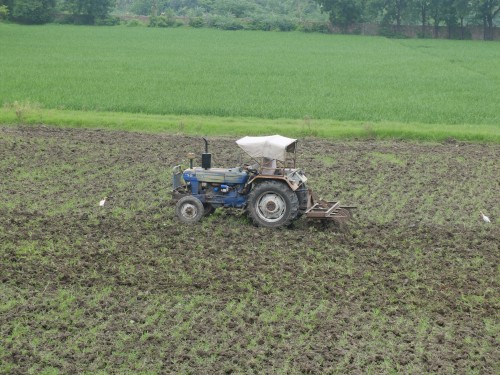 Interestingly, after so much rain there was barely any for the next two weeks and the flooded fields dried out enough to be ploughed.
Interestingly, after so much rain there was barely any for the next two weeks and the flooded fields dried out enough to be ploughed.

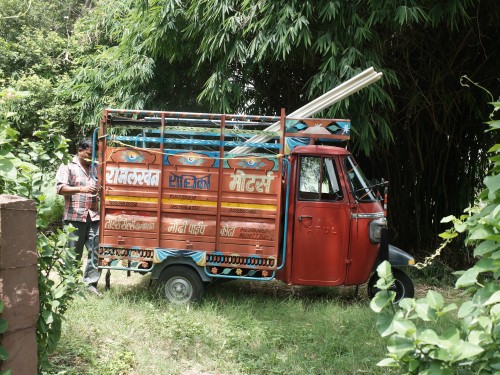 Construction had stopped on the workers' accommodation but started again at the end of the month. We had to move the water tanks from their first floor position up onto the second floor roof. Parts and pipes were ordered and were delivered in this little orange van with the signage on its side which read 'Ramlakhan Radhika Motors'. Ramlakhan was stopped by the police on his way here and found to have no valid insurance. He got away with Rs. 100 fine which was his profit on the Rs. 400 charged for delivering to us. Business has been so poor that he hadn’t been able to renew his insurance. The police know the situation and stop such people frequently to extract fines.
Construction had stopped on the workers' accommodation but started again at the end of the month. We had to move the water tanks from their first floor position up onto the second floor roof. Parts and pipes were ordered and were delivered in this little orange van with the signage on its side which read 'Ramlakhan Radhika Motors'. Ramlakhan was stopped by the police on his way here and found to have no valid insurance. He got away with Rs. 100 fine which was his profit on the Rs. 400 charged for delivering to us. Business has been so poor that he hadn’t been able to renew his insurance. The police know the situation and stop such people frequently to extract fines.

The economy is down but there is no covid-19 locally and very little in Rajasthan where ivermectin is used as a therapeutic. There has been continuous pressure on our staff to get vaccinated though; being so thin and light anyway, they have lost days of work and thus income, through being ill after receiving their vaccinations.

On the Farm - July ’21
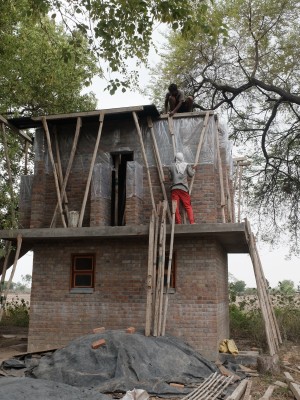 July was an anxious month waiting for rain. In the end we had approximately 20 cms. mostly in the last week. The building contractor Mishri Lal, managed to coordinate materials, shuttering, roofer and labourers and the support for the roof of the room above the toilet block was prepared by 6th July by five men fixing shuttering and rebars. We covered the walls with thin plastic so the brick work wouldn’t be splattered on concreting day. The plastic will also serve as a separation joint between the brick walls and the concrete roof to allow for movement resulting from contraction and expansion with temperature variations.
July was an anxious month waiting for rain. In the end we had approximately 20 cms. mostly in the last week. The building contractor Mishri Lal, managed to coordinate materials, shuttering, roofer and labourers and the support for the roof of the room above the toilet block was prepared by 6th July by five men fixing shuttering and rebars. We covered the walls with thin plastic so the brick work wouldn’t be splattered on concreting day. The plastic will also serve as a separation joint between the brick walls and the concrete roof to allow for movement resulting from contraction and expansion with temperature variations.
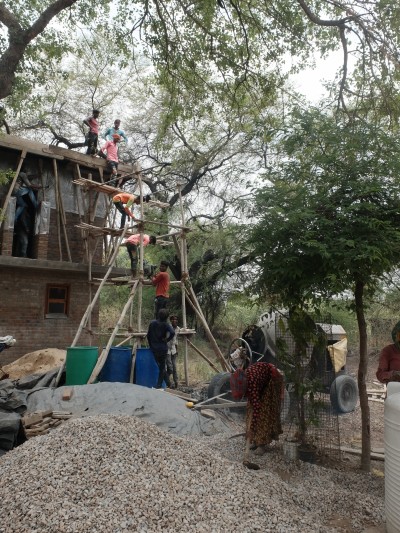 On 7th July a team of 12 labourers arrived early, the cement mixer came at 9.00am, concreting started at 11.00am and was finished by 3.30pm. The labourers were thin wiry youths who formed a human chain and passed full metal tigaris of concrete up to the roof of the room above the toilet block. The women in the team supplied the hungry cement mixer with dry ingredients.
On 7th July a team of 12 labourers arrived early, the cement mixer came at 9.00am, concreting started at 11.00am and was finished by 3.30pm. The labourers were thin wiry youths who formed a human chain and passed full metal tigaris of concrete up to the roof of the room above the toilet block. The women in the team supplied the hungry cement mixer with dry ingredients.
We managed to get the roof done the day before we left for Russia for a week and the first heavy rain in July came in our absence and some 33 bighas of rice was transplanted while we were away.

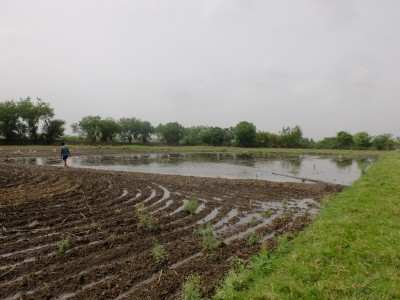
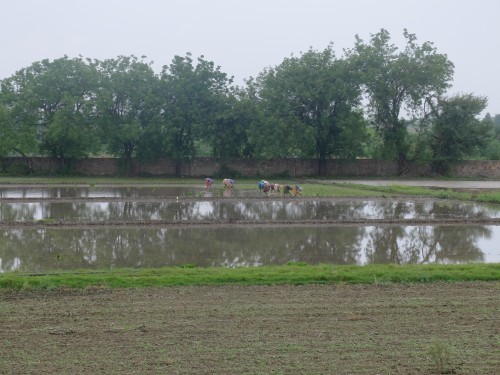
If the rice transplanting is done while the soil is still dry, the water that is pumped in the fields quickly sinks into the soil and so everyone was looking to the skies for rain as it was late. The first stage is to flood the field and Ranjeet started on the 18th. The flooded field is graded and levelled and the earth churned up by the tractor before the planters arrive, who then are able to transplant into churned up soil with some ease.
This year the team of 11 women negotiated a pay rise to Rs. 1500 per bigha. They have to stand ankle deep in mud bent over in rain or shine for this. A team of 11 started on our 20 bighas on the 24th and the heavy rain started on the 26th and continued until the end of the month.
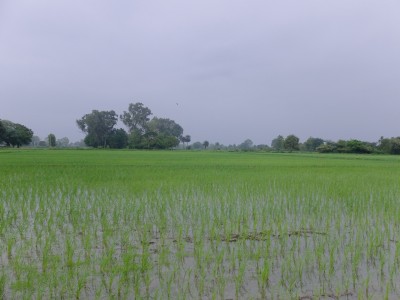 By 31st July, 53 bighas of rice had been planted and the women must have planted at least another 50 elsewhere. The change is rapid and dramatic from bare earth to flooded rice fields.
By 31st July, 53 bighas of rice had been planted and the women must have planted at least another 50 elsewhere. The change is rapid and dramatic from bare earth to flooded rice fields.

The threat of covid has receded and there were few new cases in Rajasthan and the covid wards were empty. Vaccination was going on on a voluntary basis and vaccines were being offered to everyone over 18, but with a shortage of doses there were enormous queues. They seem to be trying to give one dose to as many people as possible to hide the fact that a large percentage of people are refusing a second dose in view of the severe reactions they and their colleagues experienced after the first dose. Serum surveys show a very high level of natural immunity to the virus. To keep the fear alive the authorities are predicting a terrible third wave that will affect children and so the schools are still not opening for primary classes in the foreseeable future. This is a betrayal of children’s right to education. Some states are sending the teachers to the children but not Rajasthan.

On the Farm - June ’21
By the beginning of June, after unusual rain in May i.e. 3.3 cms., the farm was tilled and waiting for rain but it didn’t come. On eight days we had short showers only amounting to 2.17 cms. The temperature also climbed and for the last few days of June was about 42oC with a hot wind.

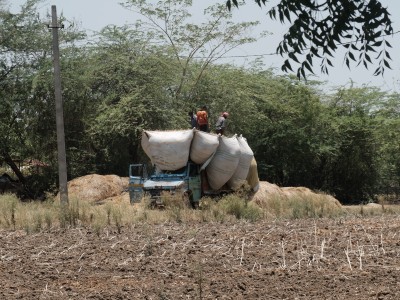
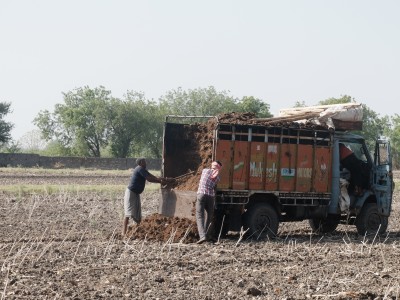
We sold some surplus pral or rice straw for Rs. 2000 and paid Rs. 4500 to buy some buffalo khad (fertiliser) from the same people. Here they are unloading it and leaving it in neat piles across the field which had to be spread by hand. In the early morning the peacocks were attracted to the gobar (manure) and one morning there were 3 peacocks each on his own castle of a manure pile. I couldn’t capture that but the picture below gives an idea of our peacock population on the farm.
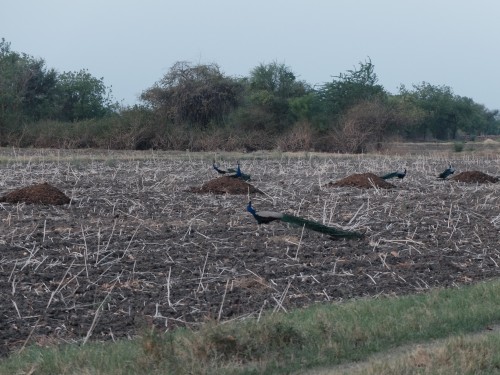

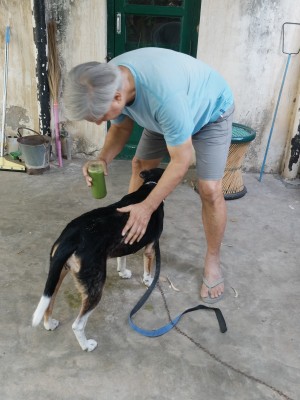 The dogs and calves were very troubled by ticks and we tried not to use a pesticide on them. By soaking fresh neem leaves in water and grinding them into a paste which is sieved through muslin, a fairly effective anti-tick medicine is made. It was used several times by being sprayed on the cows and calves and was effective enough.
The dogs and calves were very troubled by ticks and we tried not to use a pesticide on them. By soaking fresh neem leaves in water and grinding them into a paste which is sieved through muslin, a fairly effective anti-tick medicine is made. It was used several times by being sprayed on the cows and calves and was effective enough.
Here Lucy is being bathed and treated with our home made neem insecticide. It wasn’t really effective enough and we resorted to the very toxic Nayflee or Spot-on which you spot down the dog’s back. This contains the very toxic FIBRONIL and METHOPRENE which is ending up in rivers and water bodies in Britain in significant amounts as pet owners use flea treatment and bathe their pets regularly and unnecessarily with chemicals which are banned in agriculture. Some rivers down stream of water treatment plants contain 38 times the permitted level! There are 10 million pet dogs in the U.K. and 11 million cats with an estimated 80% being treated for fleas with fibronil.

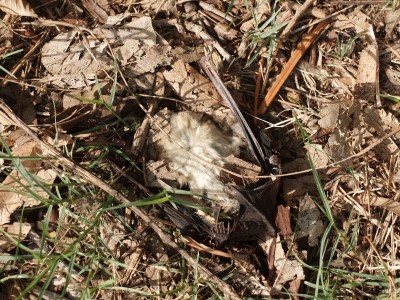
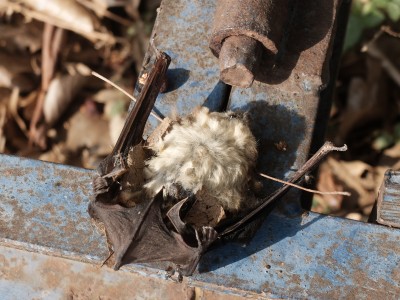
And from fleas to bats which have been very much in the news as a source of corona and other viruses. This fruit bat was spotted comouflaged in the leaves and we were surprised to see how fluffy its belly was. You can spot its legs and wings more clearly in the second photo.

June continued to be a bad month in Rajasthan for covid-19 but there were no deaths in our village. As conditions gradually eased all shops were allowed to open from 6:00am - 11:00am with a 3-day lockdown at the weekends.By the end of June this was reduced to only Sunday.
Sugna, our maid, had been living on the farm but this was only partly for fear of bringing covid from the village to the farm. She was weary of being abused by her daughter-in-law and decided a tension free life was preferable. On 8th June, after two weeks, Sugna received a delegation including her son, daughter-in-law and grandchildren all begging her to come home so she agreed on condition that the verbal abuse would stop and she went home that night. We hear very little about the relatively new trend of 'mother-in-law abuse'!
A village leader and former Sarpanch died of cancer this month but we couldn’t participate in any funeral rites. A young man was crushed to death by his tractor which overturned on him. It is thought he dozed off while driving at night. There is no reliable data for covid deaths versus others.
Our building works made no progress because of lockdown and then from shortage of trained masons so everyone wanted them at once. We are hopeful that roofing work will start in early July. The main farming activities have involved clearing scrub and preparing vegetable beds. We don’t usually have vegetables planted by this time as they get waterlogged or choked with grass as the patch reverts to a grass field during the monsoon.
Time will tell.

On the Farm - May ’21
A semi-lockdown had been expected from 18th April involving the closure of non-essential shops and night curfews. Fruit, vegetables, dairy and grocery shops were open until 11.00am. Our masons were able to come but, as expected, a full lockdown came into force from 10th-24th and was extended.
There were worrying stories from the villages of 2-4 (do-char) people a day dying from covid-19 after a mere four days of illness. On 12th May the first death occurred in our village. The deceased was brought back from hospital in zipped plastic and taken straight to the cremation ground by men in plastic. Our milkman (he buys our cows milk) was isolating at home with covid but buffaloes needed milking and the milk round needed doing so after 11 days of no one coming to buy our excess milk his son started his round.
The second unusual feature in May this year was the weather. We had some rain on nine different days including 2.11 cms. on 21st May and the farm flushed with green grass. This was partly due to a cyclone off the west coast of India. We were grateful as the temperature didn’t go above 42oC all month - we normally have 45oC for at least a week with dust storms. Once it was mere 25oC.

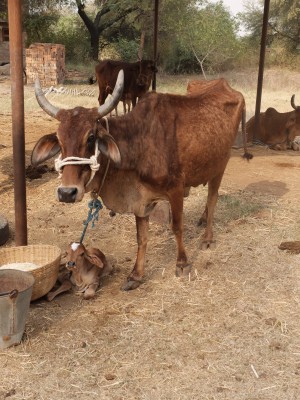 On 1st May Tikku produced a little red calf with a white blaze on her forehead. This was proof that our black Holstein-crossed bull Diamond named after the white blaze on his forehead, had taken on the head of the herd role after the death of the former patriarch Lasho. We called the calf Heera, which is Hindi for diamond.
On 1st May Tikku produced a little red calf with a white blaze on her forehead. This was proof that our black Holstein-crossed bull Diamond named after the white blaze on his forehead, had taken on the head of the herd role after the death of the former patriarch Lasho. We called the calf Heera, which is Hindi for diamond.

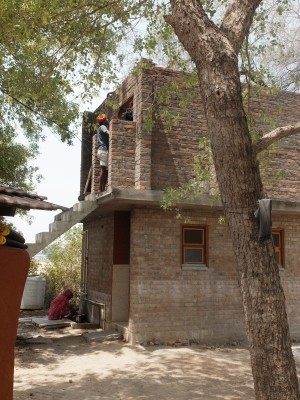 The masons were able to come at the beginning of the month and were just able to finish the lintels and the last course of bricks before lockdown. (The formerly healthy uncle of one of the masons had died eight days after being vaccinated but the link was denied by doctors so no one accepting liability.) In some villages people run and hide when the vaccination team arrives as they are more scared of the vaccine than the virus.
The masons were able to come at the beginning of the month and were just able to finish the lintels and the last course of bricks before lockdown. (The formerly healthy uncle of one of the masons had died eight days after being vaccinated but the link was denied by doctors so no one accepting liability.) In some villages people run and hide when the vaccination team arrives as they are more scared of the vaccine than the virus.

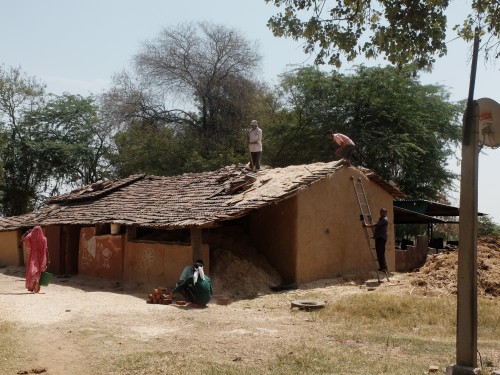 We employed a family team to collect the wheat straw from the fields on 1st May and unload it at the cow shed. Three men and three women came and a young boy also came to look after a baby. The labourers worked in the cool of the night and slept on the straw in the open.
We employed a family team to collect the wheat straw from the fields on 1st May and unload it at the cow shed. Three men and three women came and a young boy also came to look after a baby. The labourers worked in the cool of the night and slept on the straw in the open.
On the 2nd the men filled the bhousa ghar through the roof.

On 4th May, one of our men who has been with us for years announced that he was leaving the next morining! He’d got a lift to Madhya Pradesh with a truck that had brought the dowry for a young bride, probably a bed, a metal cupboard and maybe a cooler plus other home making articles. He and his son packed up at midnight and left at 3.00am. Although the border between Rajasthan and Madhya Pradesh was officially closed the driver must have had a permit and they were allowed through. Amar Lal’s wife and two daughters were already in his village.
Ranjeet promptly moved into Amer Lal’s house during the day and vacated his house which needs serious repairs. Ranjeet is a capable worker but has a weakness for drink. He spent 12th May in police custody as a drinking companion had accused him of stealing his mobile phone after a drinking session. He managed to engage a lawyer, was produced in court, and given bail, but no one would pay it for him. At last he borrowed it from somewhere and was able to come home.

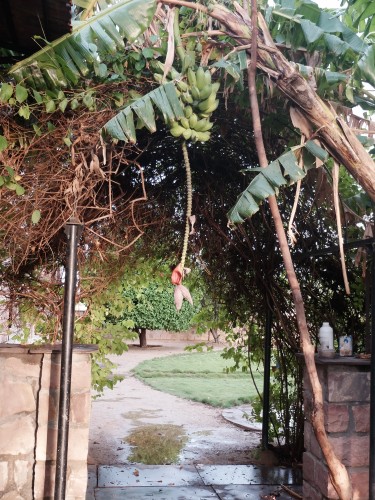
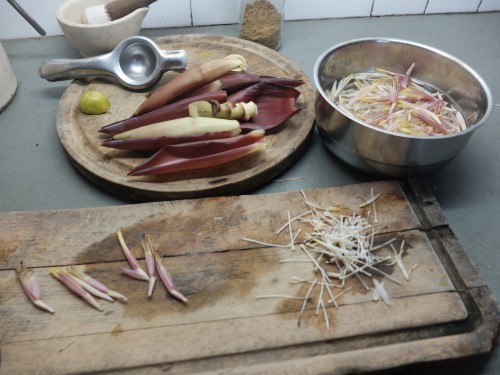
Last month we showed the laden jackfruit tree. This month we harvested some bananas from just outside the kitchen door. I made kebabs from the green bananas and curry from the flower and stems. I made a Sri Lankan coconut sauce and although the florets of the flower tasted a bit bitter, the sauce was good! When the bananas ripened they were delicious whizzed up with our own deshi mangoes.

On the Farm - April ’21
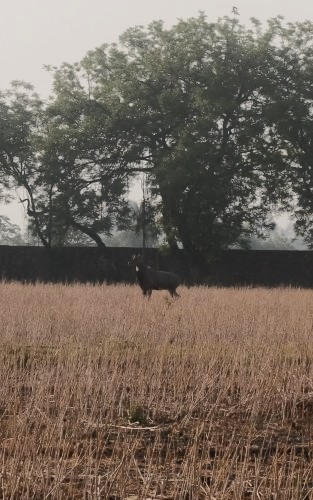 A male nilgai (blue bull) watches as the year moves onto April. One year on from total lockdown, and the direction of travel was going towards a total lockdown again. The vaccine roll out started in India in mid-January and a surge in cases started at roughly the same time. Farmers had been sitting shoulder to shoulder all winter with no spread but something has changed.
A male nilgai (blue bull) watches as the year moves onto April. One year on from total lockdown, and the direction of travel was going towards a total lockdown again. The vaccine roll out started in India in mid-January and a surge in cases started at roughly the same time. Farmers had been sitting shoulder to shoulder all winter with no spread but something has changed.
Cambridge University researchers after sequencing the genomes found that the UK variant had come into India in December in one part of the Punjab and Mumbai and had spread from there. Being more transmissible (so we are told) but no more lethal it has led to hundreds of thousands of new infections every day and a tiny percentage of those cases end in death but the world’s media was flooded daily with harrowing footage of desparate family members searching for oxygen for their loved ones. In Delhi damaged lungs from long term air pollution has added to the lethal mix. To put the deaths into some context: It is estimated that 1.5 million Indians die a year from air pollution, which is 4383 a day; Corona death figures are around 4000 at the moment but these may be only those who die in hospitals and not those who die quietly and unsung in villages; 27000 all cause mortality is a daily figure.
Who will notify the authorities of the death of a poor person with no property to pass on? How many old people are dying unmourned abandoned by their children? During a lockdown with no visiting of family allowed and no income as no work how can children care for their parents? This is the grim reality. The missing adults may only be noticed in a house to house survey checking the electoral lists and children may never be missed officially.
We also do not know of post vaccination deaths as these are officially denied. We hear of them but this is anecdotal evidence as there is no official reporting system for adverse effects in India. We do know that the chosen vaccine brand ambassador for Tamil Nadu, a very well known 59 year old comedian called Vivek, died the day after being vaccinated on television of cardiac arrest.
And so against a backdrop of vaccinations, seasonal fevers and malaria, April unfolded.

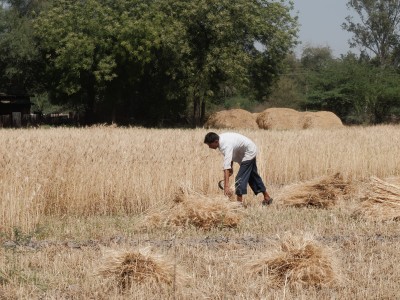 Our organic heritage wheat for home consumption is being cut here by Laxman. It took less than one hour to thresh. The yield was less than half that of a commercial variety.
Our organic heritage wheat for home consumption is being cut here by Laxman. It took less than one hour to thresh. The yield was less than half that of a commercial variety.
A combine harvester arrived at 9.45am on 10th April and had harvested 33 bighas by lunch. 20 bighas were hand cut by sickles and threshed at night on the 18th and 19th. The levels of nitrogen dioxide (NO2) are often very high, particularly at night and we don’t know why. This is no different from most cities in the world but we wonder why it's highest at night and how dangerous it is. When it's cloudy our air sometimes smells gassy and we wonder if local industry is releasing gas at night.

 For two weeks from 18th April we had semi-lockdown with night curfews and only essential shops open until 11.00am. Construction work stopped apart from government projects. We were able to keep going as our masons could come round on the bypass and avoid police checks. At the beginning of April the walls for an upper room above the new toilet block were marked out with blue lines. The two masons with an assortment of a single labourer each would arrive sporadically on two motorbikes. By the end of the month the walls were nearly complete.
For two weeks from 18th April we had semi-lockdown with night curfews and only essential shops open until 11.00am. Construction work stopped apart from government projects. We were able to keep going as our masons could come round on the bypass and avoid police checks. At the beginning of April the walls for an upper room above the new toilet block were marked out with blue lines. The two masons with an assortment of a single labourer each would arrive sporadically on two motorbikes. By the end of the month the walls were nearly complete.

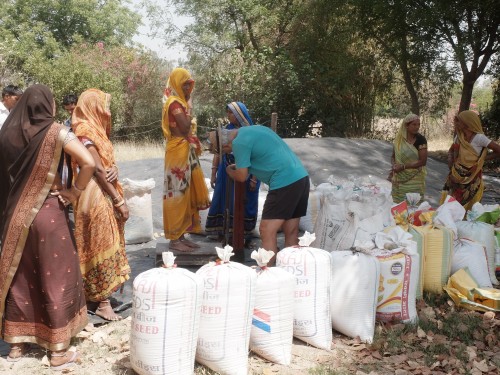 Six women cut, bundled, stacked and threshed the wheat and were paid in wheat. They negotiated an increase from 90kgs. per bigha to 95kgs. and came to bag their share on the 18th. We always weigh the women too and one woman weighed just 40kgs. You are not allowed to donate blood unless you weigh over 50kgs. and yet the same vaccine dose is given to a 40kgs. adult as to her 69kgs. team mate.
Six women cut, bundled, stacked and threshed the wheat and were paid in wheat. They negotiated an increase from 90kgs. per bigha to 95kgs. and came to bag their share on the 18th. We always weigh the women too and one woman weighed just 40kgs. You are not allowed to donate blood unless you weigh over 50kgs. and yet the same vaccine dose is given to a 40kgs. adult as to her 69kgs. team mate.

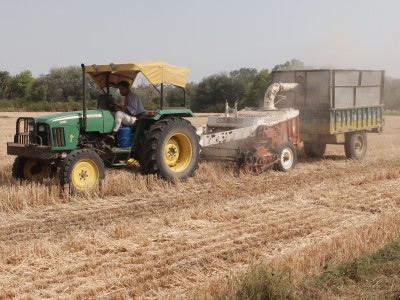 After the combine had finished, a straw cutting machine came round to chop the remaining wheat stalks and turn it into cattle feed. The machine charged Rs. 1500 per trolley and it could be sold for Rs. 2000.
After the combine had finished, a straw cutting machine came round to chop the remaining wheat stalks and turn it into cattle feed. The machine charged Rs. 1500 per trolley and it could be sold for Rs. 2000.
The first trolley load of our wheat was sold on 22nd April for Rs.1931/100kgs in the grain market. We decided not to sell locally from the farm and not to encourage strangers entering and mixing with our men.

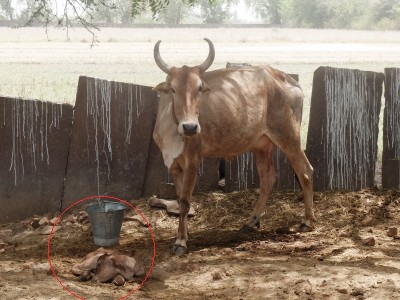 On 21st April a cow called Ramini gave birth to a little female calf (in circle). She wouldn’t let anyone near her and I had to fetch Mewa Lal who has known her all her life. He wasn’t allowed near either, but by feeding and distracting her, Deepak was able to lassoo her horns and tie her up. Her calf was picked up and moved and she followed later. We thought little Surya (Sunshine) had a spinal injury but by evening she could stand up and was just weak.
On 21st April a cow called Ramini gave birth to a little female calf (in circle). She wouldn’t let anyone near her and I had to fetch Mewa Lal who has known her all her life. He wasn’t allowed near either, but by feeding and distracting her, Deepak was able to lassoo her horns and tie her up. Her calf was picked up and moved and she followed later. We thought little Surya (Sunshine) had a spinal injury but by evening she could stand up and was just weak.

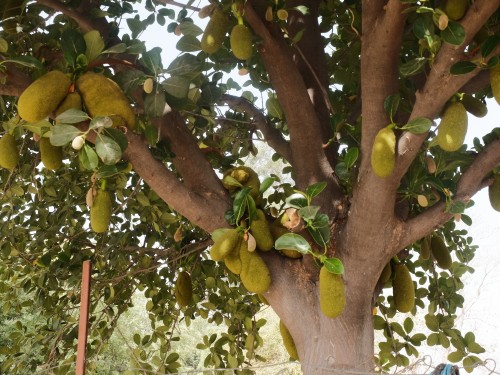 While March was a mustard month, April was definitely a wheat month. It also saw our lone jackfruit tree resplendent with a promisie of a rich harvest.
While March was a mustard month, April was definitely a wheat month. It also saw our lone jackfruit tree resplendent with a promisie of a rich harvest.

On the Farm - March ’21
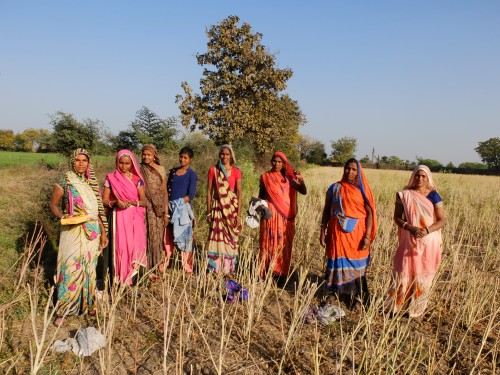 March was "mustard" month. This is the team of hard working women who cut and threshed it. After their work they were given laddus and Kailash, the team leader, is holding the box of laddus. They have been searching for ber (berries) from a tree behind them.
March was "mustard" month. This is the team of hard working women who cut and threshed it. After their work they were given laddus and Kailash, the team leader, is holding the box of laddus. They have been searching for ber (berries) from a tree behind them.

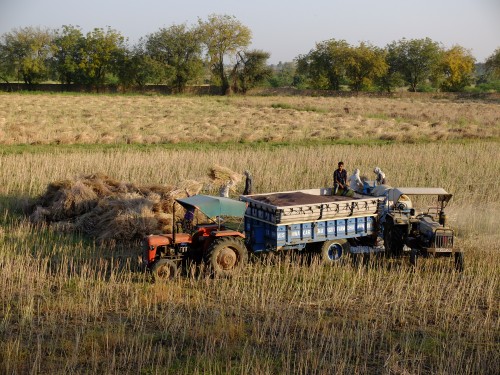 After cutting and drying the mustard was threshed and the first trolley left for the mandi on 3rd March with the second going on the 5th. The price of Rs. 4871/100kgs. was good and reflects the increased demand for pure mustard oil after the ban on blending mustard with rice bran oil, soyabean or palm oil came into effect on 1st October, 2020. In 2018 the price had been Rs.3632, in 2019 Rs. 3501 and last year Rs. 3948.
After cutting and drying the mustard was threshed and the first trolley left for the mandi on 3rd March with the second going on the 5th. The price of Rs. 4871/100kgs. was good and reflects the increased demand for pure mustard oil after the ban on blending mustard with rice bran oil, soyabean or palm oil came into effect on 1st October, 2020. In 2018 the price had been Rs.3632, in 2019 Rs. 3501 and last year Rs. 3948.

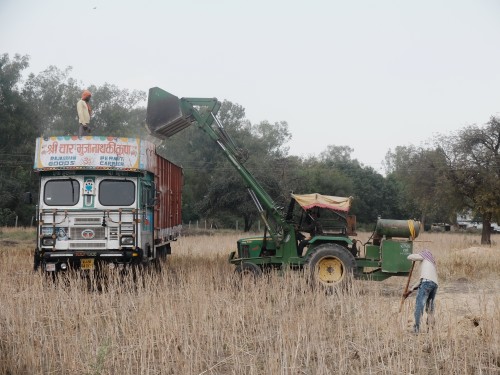 After the threshing the piles of chaff called bhoosa are left behind and they were sold at Rs. 500 per bigha of land area. It is usually a time consuming business to load the bhoosa trollies which are a feature of Indian roads at this time but this year the buyer came with a tractor mounted shovel and a lorry and the job was soon done. It was like watching a ballet as the tractor twirled and pirouetted raising and lowering its shovel.
After the threshing the piles of chaff called bhoosa are left behind and they were sold at Rs. 500 per bigha of land area. It is usually a time consuming business to load the bhoosa trollies which are a feature of Indian roads at this time but this year the buyer came with a tractor mounted shovel and a lorry and the job was soon done. It was like watching a ballet as the tractor twirled and pirouetted raising and lowering its shovel.

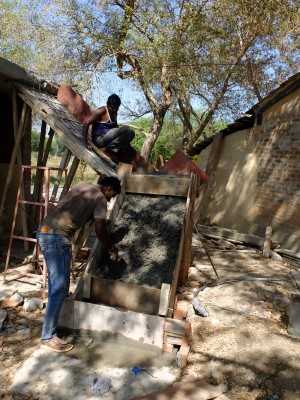 The building work progressed slowly and concreting of the steps was done at the beginning of month. It was too small a job to warrant the hiring of a concrete mixer. Once the steps set, work on the room above the toilets commenced.
The building work progressed slowly and concreting of the steps was done at the beginning of month. It was too small a job to warrant the hiring of a concrete mixer. Once the steps set, work on the room above the toilets commenced.

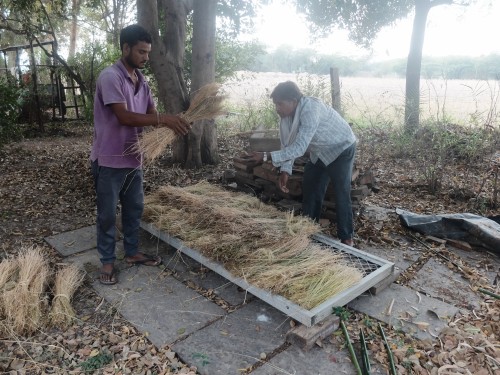 We had little rain in March, but it was an unusually hot month. It started on 13oC minimum and 34oC maximum and finished at 27oC minimum and 34oC maximum. We had a very hot wind on 7th March with the temperature rising to 37oC so we needed the cooler for the first time this month.
We had little rain in March, but it was an unusually hot month. It started on 13oC minimum and 34oC maximum and finished at 27oC minimum and 34oC maximum. We had a very hot wind on 7th March with the temperature rising to 37oC so we needed the cooler for the first time this month.
This alsi or flax was hand cut and dried and after threshing the stalks were tied into bundles and attached to a metal frame which protects the cooler from the direct rays of the evening sun. By spraying the flax with water we hoped to increase the cooling effect of the cooler but the smell was unpleasant.

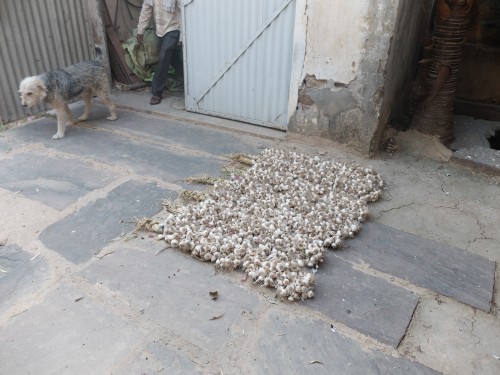 Another crop that was harvested in March was the garlic. After drying it was plaited into 7 large bundles and shared. We keep one bundle for the house, one for sowing and distribute the others to our farm team. Tigger likes to keep an eye on things!
Another crop that was harvested in March was the garlic. After drying it was plaited into 7 large bundles and shared. We keep one bundle for the house, one for sowing and distribute the others to our farm team. Tigger likes to keep an eye on things!

On the Farm - February ’21
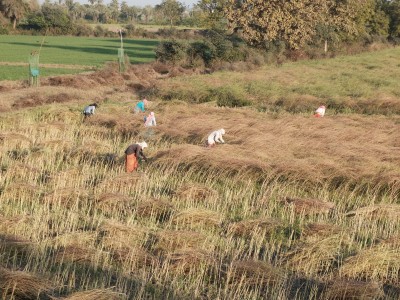 February started with temperatures of 7oC and 28oC. By the end of the month it was 17oC and 35oC.
February started with temperatures of 7oC and 28oC. By the end of the month it was 17oC and 35oC.
The women came to cut the mustard from the 12th. The team was about 12 strong but the mother of one of the women died on 21st February and at least four women stopped work for 12 days for the mourning period. It took five days to cut the ripe mustard and it was left to dry. While cutting the first field a family of seven pigs trotted out!
Panditji’s wife died on 24th February having been bed ridden for some years and the full team was involved in the funeral so they restarted on 25th February, cut some mustard sown later and piled up the crop into gallas ready for threshing. Neither of the old women’s deaths were covid releated. There have been no covid deaths around here, but still the primary schools are closed.

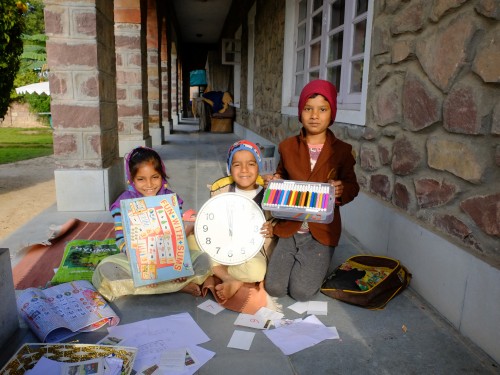 My three pupils were very excited as their parents were asked to the school to enrol them but it turned out that they can’t start until 1st April. There is no justification for depriving young children of formal education, particularly if they can walk to their school.
My three pupils were very excited as their parents were asked to the school to enrol them but it turned out that they can’t start until 1st April. There is no justification for depriving young children of formal education, particularly if they can walk to their school.

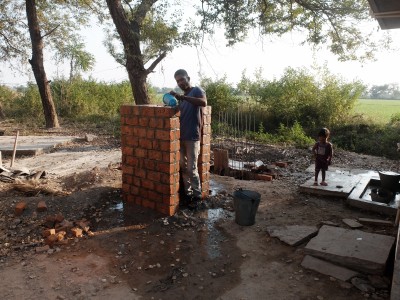 Construction of a room over the toilet block started with a support for an outside staircase. Home designed and made metal ties were used to tie in the reinforced grouted masonry. (A wall in a newly constructed workshop nearby blew out in the wind recently as the bricks had not been properly secured to the concrete pillars!) On the 28th form work for the stairs was put in place.
Construction of a room over the toilet block started with a support for an outside staircase. Home designed and made metal ties were used to tie in the reinforced grouted masonry. (A wall in a newly constructed workshop nearby blew out in the wind recently as the bricks had not been properly secured to the concrete pillars!) On the 28th form work for the stairs was put in place.

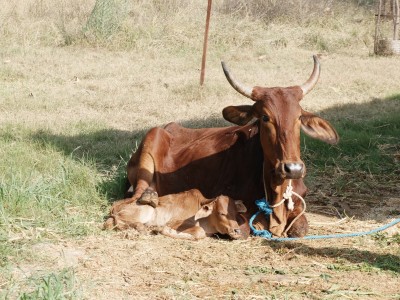 One of our cows, Charlotte, named after the designer of our upholstery print in 2012, had her fourth calf, Reena, on the 23rd. I have not noticed any of our cows sitting with a protective hoof round their new born before.
One of our cows, Charlotte, named after the designer of our upholstery print in 2012, had her fourth calf, Reena, on the 23rd. I have not noticed any of our cows sitting with a protective hoof round their new born before.

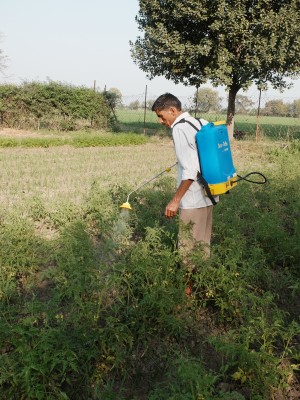 Our wheat was watered for the first time in February after urea had been broadcast. Our taller traditional non-hybrid variety of wheat was not given chemical fertiliser. Our vegetables are not given chemicals either. Laxman made a pesticide by soaking pounded neem leaves in water and spraying the sieved result. This back sprayer is battery operated and rechargeable. Hand pumping is not required. We have some cherry tomatoes for the first time this year and I am looking forward to them. Our pea harvest was delicious. New potatoes were dug up this month and we shared them out.
Our wheat was watered for the first time in February after urea had been broadcast. Our taller traditional non-hybrid variety of wheat was not given chemical fertiliser. Our vegetables are not given chemicals either. Laxman made a pesticide by soaking pounded neem leaves in water and spraying the sieved result. This back sprayer is battery operated and rechargeable. Hand pumping is not required. We have some cherry tomatoes for the first time this year and I am looking forward to them. Our pea harvest was delicious. New potatoes were dug up this month and we shared them out.

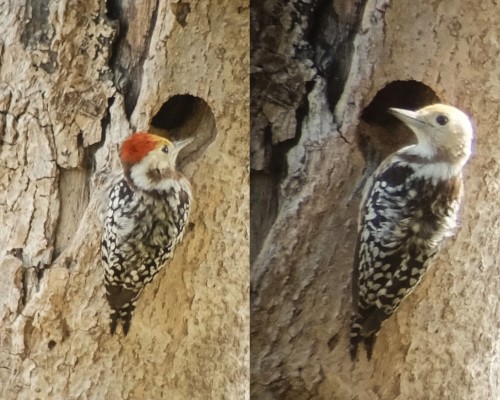 While the young wheat was vulnerable up to 16 nilgai would come in at night to browse and that was a nightly job scaring them away with a powerful torch. And to end this month’s blog with a bird species we were very pleased to welcome this pair of Mahratta woodpeckers which drilled several holes in our dead tree trunks before choosing one. This year is our 25th on the farm. A cycle of tree planting and dying has taken place and woodpeckers and other species are taking up residence.
While the young wheat was vulnerable up to 16 nilgai would come in at night to browse and that was a nightly job scaring them away with a powerful torch. And to end this month’s blog with a bird species we were very pleased to welcome this pair of Mahratta woodpeckers which drilled several holes in our dead tree trunks before choosing one. This year is our 25th on the farm. A cycle of tree planting and dying has taken place and woodpeckers and other species are taking up residence.

On the Farm - January ’21
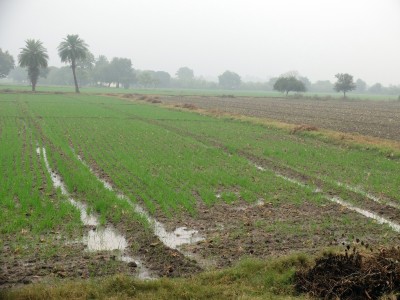 January is our coldest month and temperatures at night dropped to 5oC but day time temperatures were mostly in the mid-20's. We only had one day when the sun didn't come through and the temperature struggled up to 18oC. Often we have foggy spells but that didn't happen this year. We did however have unusually heavy rain at the beginning of January and again on 8th and 9th January amounting to 5 cms.
January is our coldest month and temperatures at night dropped to 5oC but day time temperatures were mostly in the mid-20's. We only had one day when the sun didn't come through and the temperature struggled up to 18oC. Often we have foggy spells but that didn't happen this year. We did however have unusually heavy rain at the beginning of January and again on 8th and 9th January amounting to 5 cms.

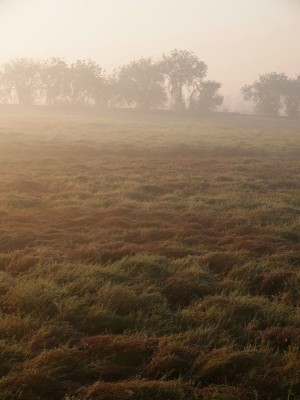 The young wheat benefitted as did the mustard which began the month in flower but by the end was beginning to ripen. Here is a misty mustard photograph taken on 30th January.
The young wheat benefitted as did the mustard which began the month in flower but by the end was beginning to ripen. Here is a misty mustard photograph taken on 30th January.
The main farming activities were cutting undergrowth from last monsoon, repairing the nilgai (deer) fence to try and deter the 14 or so nilgai spotted one night, and watering wheat.

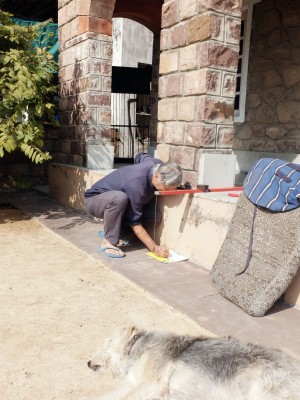 We are about to build a first floor room over the new toilet block and so the space was pegged out for the base of the external staircase.
We are about to build a first floor room over the new toilet block and so the space was pegged out for the base of the external staircase.
Another project is to have at least two sun dials made using some French software (Shadowspro) and so measurements were taken to determine the declination of the walls where they will be fastened.

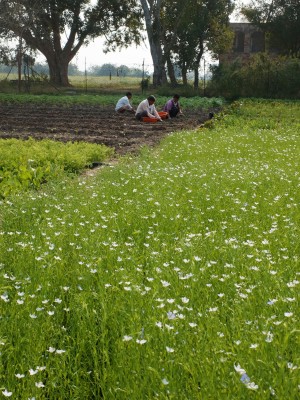
The vegetable garden this year looked immaculate as we are employing three men full time on the farm to help the local economy. Here you can see the flowering flax or linseed in the foreground.

Schools, colleges and educational institutes went back on 18th January but junior classes are still closed despite Covid-19 having almost disappeared from Rajasthan and certainly from the villages. I taught three farm children each day to help as I forsee a national crisis of poorer children dropping out of mainstream education when schools reopen.
The world was made aware of the low transmission of Covid-19 in India as thousands of maskless farmers demonstrated in huge crowds and camped out in near freezing temperatures to try to force the government to backtrack on its neo-liberal agenda of opening up Indian agriculture to big agricultural companies such as Cargill and Monsanto. We personally are unlikely to be affected by the so-called reforms as we will still sell our crops in the mandis and are unlikely to enter into contract farming. We do support the independence of small farmers however and bio-diversity and feel that control of seed production is at stake, a matter of national security. With so much unemployment and under employment millions are dependent on growing their own food and access to land. The old model of forcing people off the land and into the cities will not work with no jobs to go to, or at best menial ones with no security or guarantees. With no furlough system and government support people have to support themselves.

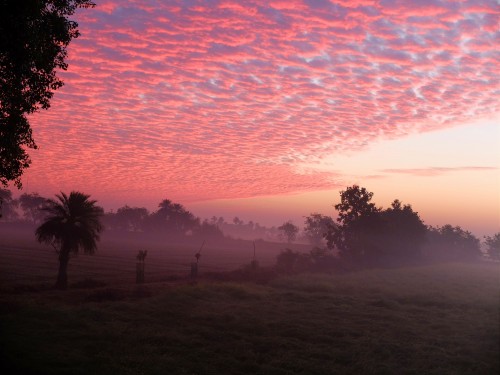 We had some spectacular sunrises in January as well. These purple clouds were photographed on Makkar Sankranti which each year falls on 14th January.
We had some spectacular sunrises in January as well. These purple clouds were photographed on Makkar Sankranti which each year falls on 14th January.

